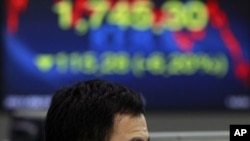Japan's benchmark Nikkei index fell for a third consecutive day, losing two-and-half percent and marking its lowest close in five months.
Concerns about forecasts of lower economic growth in the United States, the world's largest economy, caused continued selling. There was also a bout of fresh selling when a magnitude 6.8 earthquake hit northeastern Japan late in the trading day.
In South Korea, the key stock index, the KOSPI, plunged and finished the day six-and-a-quarter percent lower.
William Hunsaker, the head of strategy at Daewoo Securities in Seoul, notes the government has asked pension funds there to buy on the market dips.
"We've seen during the last two weeks that the pensions funds have been purchasing. So they have been facilitating in terms of helping the market keep higher than it has. And I don't have the number specifically for today but I presume that they were again participating even though the overall institutional investor was selling quite heavily," said Hunsaker.
South Korea this month banned short-selling of stocks until November 9, hoping to put the brakes on the domestic market's downhill slide.
Hunsaker says today's numbers suggest that strategy did not work so well.
"For right now there's not really any indication of how significant that policy move was," he said. "The purpose of the ban was to keep the market volatility from rising.”
Analysts attribute this latest decline to worries about how South Korean exporters will be affected by economic stagnation in North America and Europe. But the South Korean government is emphasizing that the developed West accounts for about only one quarter of the country's exports while most of the business is with emerging economies.
In Hong Kong, the Hang Sang index lost more than three percent on the day.
The U.S. dollar, in Asia, traded around 76.5 yen, close to its all-time low, in what foreign exchange traders described as a relatively quiet session.
Japanese Finance Minister Yoshihiko Noda said he is ready to make another surprise round of official yen selling to try to weaken its value. Japan's last known intervention was on August 4, its third such move in 12 months.
Asian Markets Catch Global Selling Fever




